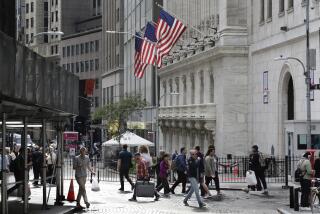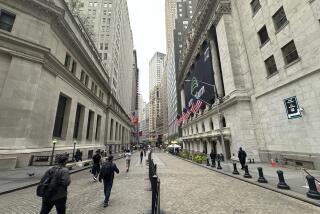Crude Costs Near 2-Week High : Heightened Persian Gulf Tensions Raise Oil Prices
- Share via
NEW YORK — Oil prices shot above $22 a barrel Monday in a gusher of nervous buying that analysts said was inspired more by headlines than economics.
Following bloody weekend clashes between Iranian pilgrims and Saudi Arabian police and renewed anti-American threats from Iran, oil prices jumped sharply when trading opened on the New York Mercantile Exchange.
Prices gave back some ground later in the session as traders cashed in profits, but the spurt of buying was still enough to raise the benchmark price to its highest level in almost two weeks.
Contracts for September delivery of West Texas Intermediate, the bellwether U.S. crude oil, settled at $22.16 per 42-gallon barrel, up 79 cents from Friday’s close.
The contract traded as high as $22.67 per barrel during the day and never fell below $22, according to figures provided by Telerate Systems.
Prices of refined products also moved up sharply. Unleaded gasoline settled at 55.94 cents, up 1.07 cents from Friday’s close, while No. 2 heating oil hit 56.95 cents, up 1.60 cents.
Analysts attributed the market’s move almost exclusively to the effect of the expanding Mideast drama. They said that even though world oil supplies remain plentiful, traders harbor fears that a combination of incidents--like those of the past weekend--might eventually result in a disruption of oil shipments through the Persian Gulf.
“Clearly, nervousness is the reign of the day,” said Bob Baker, senior energy analyst at Prudential-Bache Securities.
Iran issued several new threats Monday against the United States, blaming it for the hundreds of Iranian casualties suffered in the Saudi confrontation and reiterating its promise to avenge the U.S. plan to continue protection for Kuwaiti oil tankers sailing through the troubled gulf. Those shipments resumed Monday.
“The situation in Mecca obviously caught a lot of people by surprise,” said William Byers, an analyst for Bear Stearns. “It marks a further deterioration of the political stability of the area.”
Still, some experts believe the market’s reaction to the hostilities has been overblown, considering the current oversupply of oil.
One economist, Gordon Pye of Irving Trust Co., lightheartedly suggested that futures traders install “radar-screen scopes of the Strait of Hormuz” on their computer terminals so that they could track the Persian Gulf developments even more closely.
“We’re out of the realm of economics at this point,” said Pye.
More to Read
Sign up for Essential California
The most important California stories and recommendations in your inbox every morning.
You may occasionally receive promotional content from the Los Angeles Times.










